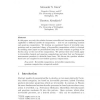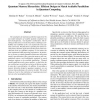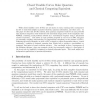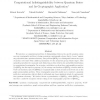7486 search results - page 19 / 1498 » The Limits of Quantum Computers |
DAC
2009
ACM
14 years 8 months ago
2009
ACM
Reversible logic is the basis for several emerging technologies such as quantum computing, optical computing, or DNA computing and has further applications in domains like low-pow...
ENTCS
2008
13 years 7 months ago
2008
In this paper we study the relation between reversible and irreversible computation applicable to different models of computation -- here we are considering classical and quantum ...
ISCA
2006
IEEE
13 years 7 months ago
2006
IEEE
The assumption of maximum parallelism support for the successful realization of scalable quantum computers has led to homogeneous, "sea-of-qubits" architectures. The res...
ECCC
2008
13 years 7 months ago
2008
While closed timelike curves (CTCs) are not known to exist, studying their consequences has led to nontrivial insights in general relativity, quantum information, and other areas....
EUROCRYPT
2005
Springer
14 years 1 months ago
2005
Springer
We introduce a computational problem of distinguishing between two specific quantum states as a new cryptographic problem to design a quantum cryptographic scheme that is “secu...




